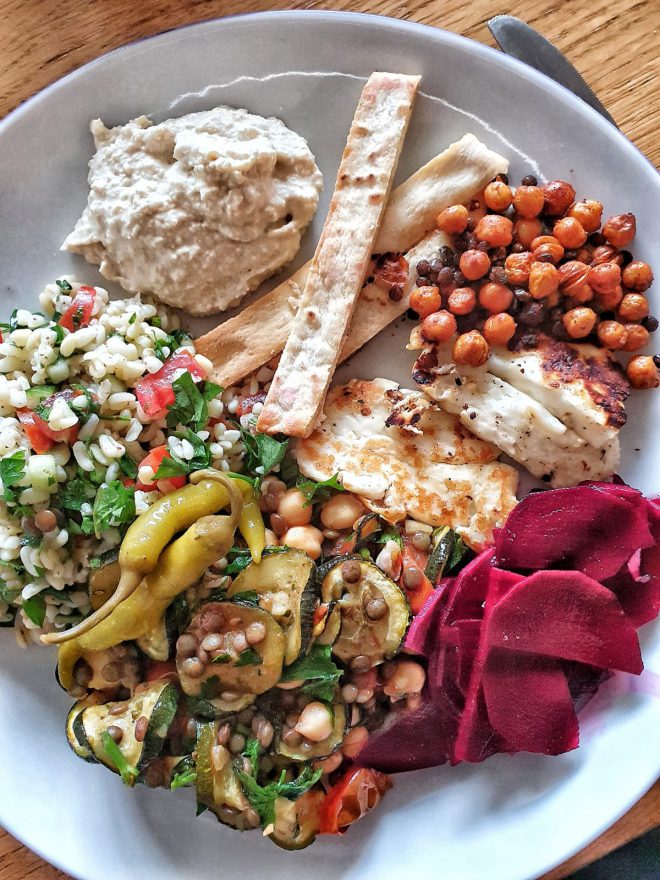Don’t have time for breakfast? Surviving on coffee until mid afternoon? Spending all day craving for something to eat? We all have good and bad days but if you’re always feel grumpy, sluggish or lack concentration then maybe you should consider whether there’s a connection between the foods you eat and how you’re feeling. As a Dietitian and as mum of two small children, planning my meals and snacks reduces the dreaded ‘hungry meltdown’ or ‘thirsty tantrum’.
But what about me? Well, as a dietitian I do plan for myself but there are so many parents who forget about caring for themselves whilst caring for their children. This blog explores how the food we eat can play a big part in how we feel.
Erratic eating patterns, over restrictive diets that lack variety and therefore key nutrients, such as carbohydrates, iron, selenium and some B vitamins can impact our mood, energy levels and brain function.
Here are 5 things you can do to plan a diet to support a positive outlook.
- Include starchy carbohydrate at each meal – when we are hungry our blood sugar levels dip causing us to feel irritable and sluggish. Our brain needs a regular supply of energy (sugar) in order for it to function effectively. It is a good idea to eat breakfast and plan regular meals that contain a starchy carbohydrate. These include: potatoes, pasta, rice, wholegrain breads and cereals, oats or other grains such as quinoa and couscous. These are also a useful source of Iron and vitamin B which helps support mental wellbeing. Forward planning of meals ensures that you have the right ingredients to create a healthy, balanced diet for you and the family.
- Include some protein at each meal – eating some protein regularly throughout the day helps to keep us feeling full, which in turn can prevent overeating. In addition, many protein foods contain micronutrients such as iron, some B vitamins and selenium which is thought to support good mood. Sources of protein include lean meats, poultry, eggs, milk, nuts, beans, pulses, seeds and fish. It is recommended that we eat two portions of fish per week, one of which is oily. Oily fish contains omega-3 which supports many aspects of our health, including our brain. If you are pregnant, breastfeeding or likely to become pregnant in the near future you should not have more than 2 portions of oily fish per week. Oily fish includes salmon, mackerel, herring, sardines, pilchards and trout.
- Snacks are not always bad – snacks are often perceived as something we shouldn’t do for fear of weight gain. When planned correctly, eating a small healthy snack between meals can sustain your energy levels throughout the day and helps to fulfil our daily nutritional needs. Planning is key to avoiding those impulsive treats like cakes, biscuits, pastries and crisps which offer only ‘empty calories’ and little nutrition. Better snack options could be a piece of fruit, vegetable sticks, yoghurts, nuts, seeds, oatcakes and crackers. You should snack because either you’re hungry or it’s a long time until your next meal or if you’re planning an exercise session.
- Get your 5-a-day – ‘Eat the colours of the rainbow’! The different colours of fruit provide different vitamins and minerals. Folate (a B vitamin) involved in supporting good mood is found in green vegetables, oranges and other citrus fruits. They also contain vitamin C which aids the absorption of iron from the carbohydrates and proteins in food and help to prevent anaemia which leaves us feeling weak, tired and lethargic.
- Drink plenty of fluid! – Dehydration can leave us feeling tired, sluggish, irritable and light-headed. You should aim to drink at least 6-8 glasses of fluid, spread throughout the day or more if you’re exercising or it’s hot. All non-alcoholic drinks count, even tea and coffee. Too much caffeine in tea or coffee could leave you irritable and give you a headache, so it is best to keep an eye on your intake levels.
Looking after young children is tiring so it is important to take the time to prioritise yourself and plan YOUR, and their, food intake, to ensure that you all benefit from a variety of foods that will supply a range of nutrients that will give you sustained energy throughout the day.
If you would like a review of your diet then do contact me or visit my website for more information. You can find me on Facebook and Instagram @lydialnutrition
Finally, thank you to Sarah for allowing me to share some of my knowledge with you in this blog.

